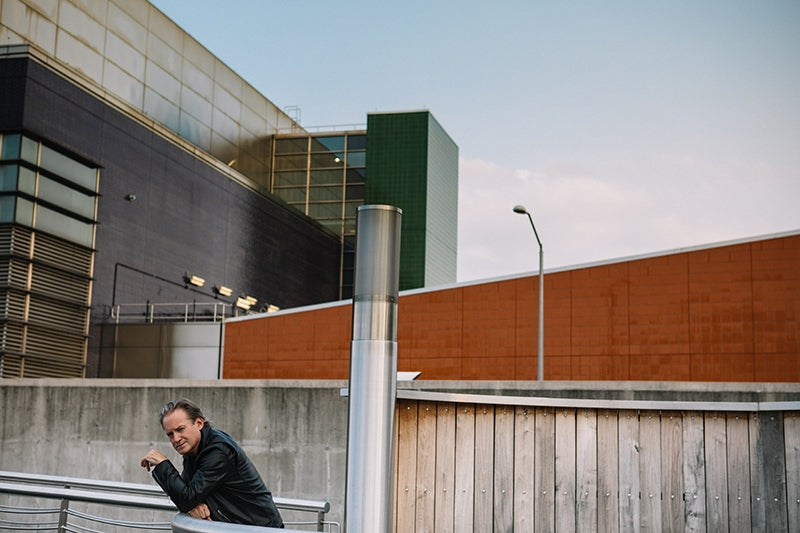Kevin Whelan is an indie-rock veteran who had long been on the scene with his band, the Wrens. The group, dating back to 1989, has been beloved by fans and acclaimed by critics, but hadn’t released any new music since 2003’s The Meadowlands, despite some fits and starts. Whelan grew tired of waiting on the other band members to release new music, and knew he had to make a change.
In 2021, in the wake of the Wrens’ demise, Whelan formed a new outfit, Aeon Station, with the intent of reaching a patient fanbase and to finally express the thoughts and feelings he’d long been harboring through the only means he knew how – by making music.
To say the songs have had a long journey is an understatement, as they were locked in a limbo of sorts. The tracks were originally intended for a new Wrens album, which never came to be, and for a long time, Whelan feared they would never receive the light of day.
Aeon Station’s Kevin Whelan is joined by old Wrens bandmates Greg Whelan on guitar and Jerry MacDonald on drums, with assistance from producer and guitarist Tom Beaujour. The album, Observatory, is everything fans of Whelan and company have been waiting for all these years, and then some.
I caught up with Kevin Whelan to ask him about his life, career, and newest music.

Andrew Daly: Kevin, I appreciate you taking the time to talk. How have you been holding up over the last year or so? What have you been up to?
Kevin Whelan: Thanks so much for asking me to do this [interview] and let your readers know about Aeon Station. I think the last few years have been a bit of suspended animation with trying to figure out this new life in the times of COVID, and what it means for each of us. These past twelve months have really [brought] this renewed focus and enjoyment with music. Given all of the life challenges we are all facing, it has been a lot of fun to just disappear into music.
AD: Before we dive into your professional career, let’s go back a bit. What first got you hooked on music?
KW: I would say, my mom. My parents loved music but were not musical. One day, my mom bought a piano from a fellow school teacher. She only brought it home because she needed to fill space in the dining room. I would look at that old wooden box with these broken keys and be captivated. I asked for piano lessons.
AD: Who were some of your early influences?
KW: That’s super easy: the Beatles and Liberace.
AD: Let’s talk about recent events. Tell us about your new project, Aeon Station, and your new record, Observatory. How did they come together?
KW: It all came together very fast. I laugh because I say fast, but nothing in my musical life has been fast. But the name for the project, and the album title didn’t come together until May of 2021. The album has five songs that I wrote, recorded, and completed in 2014. The other five songs were written and completed in 2021.
AD: Let’s dig into the lyrical themes on your new album. What message and emotions are you trying to convey? What do you want your listeners to take away from this record?
KW: It’s a great question because it’s really important to me. Without something to sing about, then it’s just a piece of music. And for me, without the words, it’s not alive yet, but [writing the lyrics is] also the hardest part as I question myself over and over again. In saying that, and thanks for asking, with Observatory, I wanted it to be honest and genuine. As I’ve gotten older, I’ve realized the closer I get to being completely genuine, the clearer I become. [And] that the message is clearer to understand.
Believe me, I am beyond happy if anyone takes to the songs and makes them their own. [If they] interpret or have their lives reflected in it for them; that is a success. So, I’m really trying to say is, what I want them to take away from it…that is up to them. [Having the] strength to make it through, believing in your dreams no matter how weird it gets, and not diminishing yourself to elevate others.
AD: As fans know, you were a member of the indie band the Wrens. How does this new project compare to your past work? What can fans expect? What excites you most about it?
KW: I love being a Wren and always will be. Being in the Wrens truly defined my life, from [the] jobs I chose, to relationships, to the way I directed my goals. I hope that anyone listening to the music [of Aeon Station] is met with familiarity and respect to the Wrens and our work, but that they also see a new idea here and there. What excited me about [the new album] is that they are new songs that are now [also] part of a long collection of songs I’ve been part of. Also, it’s so dumb, but after thirty years, I’m actually enjoying just writing songs that have no intent or expectations, other than just sitting at the piano.
AD: Easy questions now. What are a few of your favorite albums, and why?
KW: Oh wow, like all crazy music fans, I have way too many. But let’s go with: the Flaming Lips’ Yoshimi Battles the Pink Robots because it’s still Beatles songs wrapped in their weirdness. David Bowie’s Aladdin Sane for the pianos, lyrics, and singing. Vampire Weekend’s Modern Vampires of the City because for twelve songs in a row, it’s near-perfect.
AD: What other passions do you have? How do those passions inform your music, if at all?
KW: My family, [and] my work at Johnson & Johnson. Honestly, I don’t really have any other passion outside of music. Music is the one thing that is always there. I would say, just life in the office, travel, and the ups and downs of life directly influence the music.
AD: What sort of equipment do you use in the studio, and live?
KW: Well, at home, I’m a hot mess. I only use one Peluso mic, one old Peavey keyboard amp my parents bought when I was 16, and a Mac from 2005 with Logic [Pro recording software]. The other part is awesome, which is working with Tom Beaujour at his Nuthouse Recording studio in Hoboken, New Jersey.
As far as live, I play an old Yamaha bass, again bought when I was 16. It’s been sawed up, drowned, lit on fire, thrown, broken, and I’m not kidding. It’s a great old pirate of a friend. It’s sort of the Michael Myers of bass guitars. (laughs)
AD: Do you collect vinyl? CDs? Cassettes? Or are you all digital now? If you do collect physical media, why is that important to you, and why would you feel that keeping physical media alive is important in this day and age?
KW: I have vinyl, CDs, cassettes, mini-cassettes, and on and on. And yes, of course, digital. The physical because music is physical, and it’s art. To have that in your home or office, I feel defines who you are as much as a painting on the wall, or books, or furniture. As for digital, it offers amazing access to so many great songs from artists I would have never known. I am glad to see both finding a space to exist.
AD: Last one. What’s next on your docket? What are you looking forward to most in the post-COVID world? Do you plan on hitting the road or playing any festivals in 2022?
KW: Next will be shows in 2022. Given COVID safety, it will be awfully nice to play music again. I haven’t played a show in over 11 years. Thanks again for these questions and for supporting the music. You truly have no idea how much it means to me.
Header image courtesy of Ebru Yildiz.


